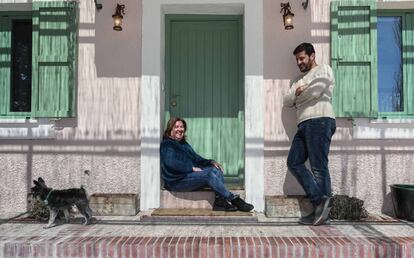Want to use clean energy? This cooperative from Madrid may have the answer
La Corriente provides wind, hydraulic and solar power to over 300 members, one of whom says their electricity bill has more than halved since joining


With its vegetable garden and solar panels, Mari Luz Sandino’s two-story stone house on the outskirts of San Agustín de Guadalix in the Madrid region is the embodiment of a carbon-free future. Beyond the pine trees and bougainvillea is an electric car while the house itself is heated with a heat pump, an energy-efficient device that absorbs heat from the ground and transfers it to the home. The 16 solar panels provide three quarters of Sandino’s electricity needs. The rest she gets from La Corriente, a Madrid cooperative that sells green energy to its 310 members.
Sandino says her electricity bill fell from €500 a month to €195 after joining La Corriente
The power circuit in Spain extends 40,863 kilometers and carries energy from various sources, 60% of which is non-renewable, such as coal, combined-cycle energy and nuclear. But the Madrid clean energy cooperative La Corriente only buys certified wind, hydraulic and solar power. As the cooperative is not-for-profit, it can offer competitive prices that are in line with those of the big suppliers. The Mercado de San Fernando market in Lavapiés is one of the cooperative’s members. A team of professionals from La Corriente visited the building, which was built after the Spanish Civil War, to see what measures could be implemented to make it better insulated.
Sandino, 55, also received energy-saving advice. Not only was she helped with getting the right contract for her needs, she also had people advising her on the design of her €8,000 solar energy system. “It was a good investment,” she says. “I paid €500 [a month] for the electricity before, but with La Corriente, I started to pay €350. Months later, after putting in the solar panels, the bill went down to €195.”

Thanks to a royal decree passed in April, Sandino can put any excess energy generated by her solar panels on the grid, which will further reduce her energy bill. Most of the cooperative’s members live in flats, which makes installing solar panels more complicated. But the new laws allow for collective auto-consumption and Soledad Montero, co-founder of La Corriente, is keen to set up such a scheme in her building. “There is not much room for solar panels on our roof, but enough for the lift or the communal lighting,” she says. “The challenge will be getting the neighborhood association to agree to it.”
Soledad Montero, 51, is the co-founder of La Corriente. She has been unemployed since the renewable energy bubble burst in 2012, when the Popular Party (PP) government cut incentives for renewables in an effort to balance the deficit as the price of electricity had not increased in line with its real cost. Five years earlier, the Institute for Diversification and Energy Saving (IDEA) had launched its famous “The sun can be yours” campaign. A lot of consumers subsequently invested in solar panels and Montero worked for a supplier who imported material from China. But when the grants were cut, the company fired many of its workers.
As citizens we also have to change our habits Pablo López, 30, member of La Corriente
Then three years ago, as the cost of renewable energy fell, a number of consumers got together in Madrid to organize a collective similar to the Basque initiative GoiEner, which provides certified green energy. La Corriente currently only sells renewable energy but its aim is to be able to generate it too. Raising consumer awareness is another important goal. “Because of a lack of information, the consumer often uses more energy than is needed. So we run workshops on energy saving,” says Montero. “We tell people they can save energy by closing the blinds at night, using a kettle instead of the cooker, washing clothes in cold water and turning off the boiler when it is not being used.”
Pablo López is another member of La Corriente who is in charge of raising awareness. The 30-year-old engineer completes studies for homeowners associations on how to install a recharge station for electric cars in communal parking spaces. It is all about reducing pollution. “The national measures are important,” he says, “such as restricting the use of private vehicles, but as citizens we also have to change our habits.”
López is concerned that if the new energy models fall exclusively into the hands of the big corporations, clean energy will always be too expensive for people on low to average incomes. Joining associations such as La Corriente, he says, is the best way of avoiding this scenario.
The National Strategy to Combat Energy Poverty
On April 5, Spanish Cabinet passed the National Strategy to Combat Energy Poverty which provides a roadmap on auto-consumption until 2024. The pioneering initiative looks at measures to improve energy efficiency in the home such as replacing thermal systems and providing grants to improve insulation. “The social voucher system is great but it is also important to politically ensure that companies won’t inflict unnecessary costs on the consumer,” says Soledad Montero, co-founder of La Corriente.
English version by Heather Galloway.
Tu suscripción se está usando en otro dispositivo
¿Quieres añadir otro usuario a tu suscripción?
Si continúas leyendo en este dispositivo, no se podrá leer en el otro.
FlechaTu suscripción se está usando en otro dispositivo y solo puedes acceder a EL PAÍS desde un dispositivo a la vez.
Si quieres compartir tu cuenta, cambia tu suscripción a la modalidad Premium, así podrás añadir otro usuario. Cada uno accederá con su propia cuenta de email, lo que os permitirá personalizar vuestra experiencia en EL PAÍS.
¿Tienes una suscripción de empresa? Accede aquí para contratar más cuentas.
En el caso de no saber quién está usando tu cuenta, te recomendamos cambiar tu contraseña aquí.
Si decides continuar compartiendo tu cuenta, este mensaje se mostrará en tu dispositivo y en el de la otra persona que está usando tu cuenta de forma indefinida, afectando a tu experiencia de lectura. Puedes consultar aquí los términos y condiciones de la suscripción digital.








































